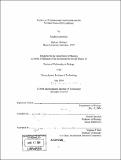Studies on X chromosome inactivation and the X-linked disease Rett syndrome
Author(s)
Luikenhuis, Sandra, 1972-
DownloadFull printable version (7.438Mb)
Other Contributors
Massachusetts Institute of Technology. Dept. of Biology.
Advisor
Rudolph Jaenisch.
Terms of use
Metadata
Show full item recordAbstract
(cont.) the RTT phenotype. Deletion of the Xist gene results in skewed X-inactivation. To distinguish primary non-random choice from post-choice selection, we analyzed X-inactivation in early embryonic development in the presence of two different Xist deletions. We found that Xist is an important choice element, and that in the absence of an intact Xist gene, the X chromosome will never be chosen as the active X. To understand the molecular mechanisms that affect choice we analyzed the role of replication timing prior to X-inactivation. The X chromosomes replicated asynchronously before X-inactivation but analysis of cell-lines with skewed X-inactivation showed no preference for one of the two Xist alleles to replicate early, indicating that asynchronous replication timing prior to X-inactivation does not play a role in skewing of X-inactivation. Expression of the Xist is negatively regulated by its antisense gene, Tsix. In order to determine the role of transcription in Tsix function, we modulated Tsix transcription with minimal disturbance of the genomic sequence. Loss of Tsix transcription lead to non-random inactivation of the targeted chromosome, whereas induction of Tsix expression caused the targeted chromosome always to be chosen as the active X. These results for the first time establish a function for antisense transcription in the regulation of Xist expression. The X-linked disease Rett syndrome (RTT), a neurodevelopmental disorder, is caused by mutations in the MECP2 gene. We used a mouse model to test the hypothesis that RTT is exclusively caused by neuronal MeCP2 deficiency. Expression of an Mecp2 transgene in postmitotic neurons resulted in symptoms of severe motor dysfunction. Transgene expression in Mecp2 mutant mice, however, rescued
Description
Thesis (Ph. D.)--Massachusetts Institute of Technology, Dept. of Biology, 2004. Includes bibliographical references.
Date issued
2004Department
Massachusetts Institute of Technology. Department of BiologyPublisher
Massachusetts Institute of Technology
Keywords
Biology.